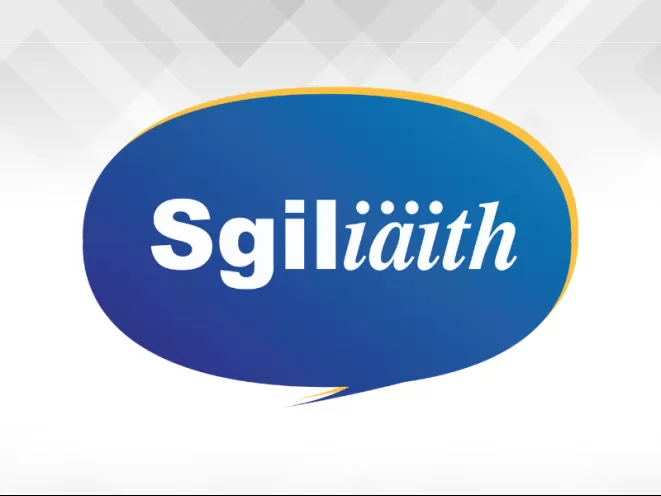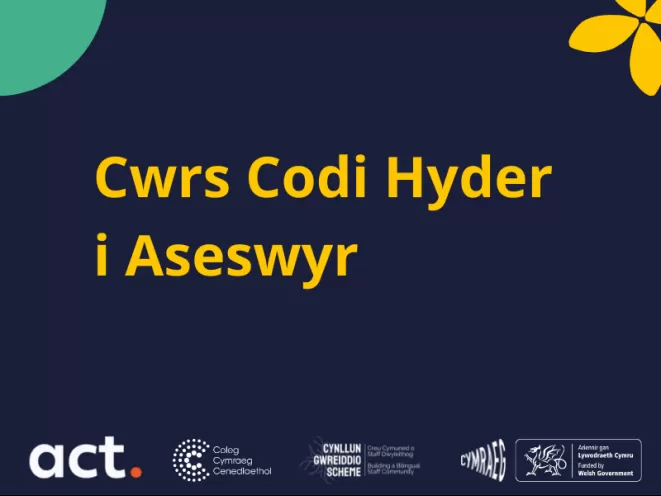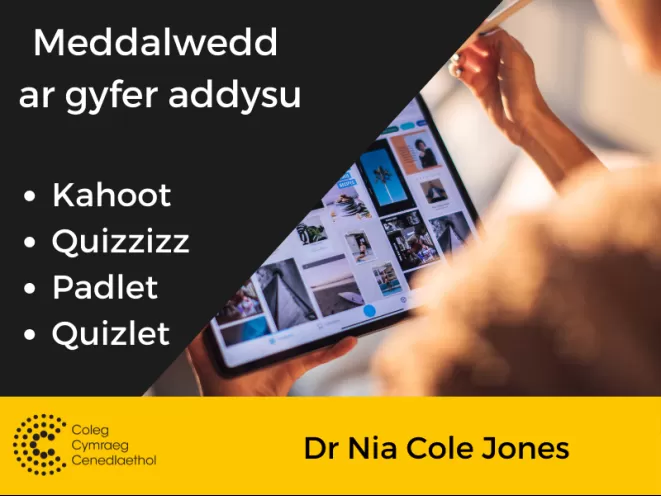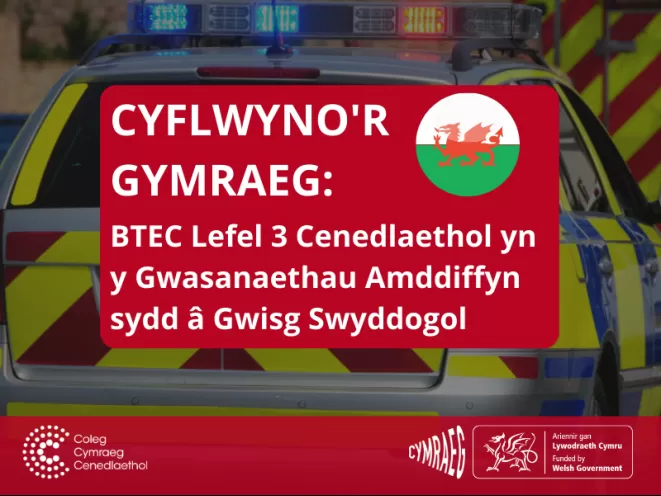These resources have been designed to support tutors to develop their bilingual teaching skills and increase their awareness of the Lifelong Learning Welsh Record (LLWR) and the LA26 data set. The data set is used to record Welsh and bilingual provision in the post-16 education sector in Wales. The aim of the resources is to give tutors confidence in the way activity completed in Welsh or bilingually is recorded on the LLWR, and to help tutors establish where their provision currently sits. They are also designed to give tutors practical advice on how to move their teaching up the bilingualism continuum. This tutor support pack includes: Handbook - a working document that can be used for reference, as well as to establish specific personal targets for increasing the Welsh/bilingual provision. Online e-learning course - Understanding the Welsh Lifelong Learning Record (LLWR). This interactive online learning module provides an overview of the Welsh Lifelong Learning Record (LLWR) and how it is used by the Welsh Government to record Welsh and bilingual provision in the post-16 education sector in Wales. Sgiliaith bilingual glossary app - 'Sgiliaith Feedback App' - this app contains a wide range of learner feedback and general phrases you can use in your role as a tutor in order to provide learners with a Welsh/bilingual experience. Links to the resources are available below and are also available on the Sgiliaith website sgiliaith@gllm.ac.uk
Further Education Tutor Support Toolkit
Raising confidence for assessors
The purpose of this online self-study course is to give assessors the resources and information to work confidently bilingually with their learners. The course considers some of the benefits and challenges of working bilingually before setting out to give information, resources and motivation that will enable assessors to develop provision and work confidently through the medium of Welsh. The course is bilingual, and is aimed at raising the confidence of assessors as they provide their training through the medium of Welsh.
Useful software for online teaching
This workshop will be useful for anyone wishing to use fun online platforms in their teaching. Through this resource, you will learn about different platforms to create varied and useful learning experiences for your students. In this resource, you will be introduced to the following platforms: Kahoot Padlet Quizzizz Quizlet Presenter: Dr Nia Cole Jones Dr Nia Cole Jones is a senior lecturer with the Open University. She graduated with a first class degree in Welsh from Aberystwyth University, and went on to study an M.Phil and PhD on the development of the Welsh language in sport and the news. She has worked in higher education for over a decade, focusing on developing students' language skills across all levels.
Health and Wellbeing Resources
Here you will have access to health and wellbeing resources that can be used in lectures, seminars or in personal tutoring meetings. Each resource is accompanied by an instruction sheet for the lecturer. Resources include: Activity 1: The Wheel of Wellbeing Directions 1: The Wheel of Welfare Activity 2: The well-being self-assessment tool Directions 2: The well-being self-assessment tool These resources have been prepared by Dyddgu Hywel, Senior Lecturer in Education, Cardiff Metropolitan University. Sources of Help If you have a medical emergency, serious problem or a threat to life, call 999 If you are worried about your mental health, the first step to getting help is to tell your GP. A list of helplines, charities and useful information can be found on the meddwl.org website
Introducing the Welsh Language: Level 3 Uniformed Protective Services
This resource is a collection of resources to support educators who wish to introduce more Welsh in the delivery of the Level 3 Uniformed Protective Services course. The collection has been created to support educators in planning and setting classroom work activities or evidence based on learners' Welsh language skills. The collection includes: • a guide that explains how to use the resource. • 'Mapping the Opportunities to introduce the Welsh language' document for each core unit. • bilingual posters of the key terms for each unit.
Introducing the Welsh language: Level 2 Health and Social Care: Core
This resource is a collection of resources to support educators who wish to introduce more Welsh in the delivery of the Level 2 Health and Social Care: Core course. The collection has been created to support educators in planning and setting classroom work activities or evidence based on learners' Welsh language skills. The collection includes: • a guide that explains how to use the resource. • 'Mapping the Opportunities to introduce the Welsh language' document for each core unit. • a series of tasks that meet the requirements of specific assessment criteria of the course. They demonstrate how it is possible for all learners to complete the same task, whilst developing their Welsh language skills at individual and appropriate levels. • bilingual posters of the key terms for each unit. • a resource that provides ideas for learners to use the Welsh language on work placements.
Language awareness and bilingualism in teaching
The resource consists of four presentations: Part 1 - Language Awareness in the Higher Education Context Part 2 - Group Profiling Part 3 - Bilingualising a lecture or seminar Part 4 - Resources to support bilingual teaching Aims of the workshop: An introduction to language awareness in education, in the context of higher education. Develop an understanding of the importance of student profiling and how this information can be used to plan lectures and seminars. An introduction to a variety of practical techniques to bilingualize lectures and seminars and enhance students' language experience in English lessons. To share useful resources to support trainees/teachers to embed Welsh within lectures and seminars. Content: An update on national policies with regards to the Welsh language in Higher Education. An overview of the benefits of profiling students' language skills (ability, use and aspects of Welsh) and how trainees can use this knowledge to plan their teaching and create opportunities for students to use and develop their Welsh. Various and practical techniques for bilingual lectures and seminars. Advice on including Welsh key terms in English lectures. Overview of useful resources to support trainees to embed Welsh within lectures and seminars (e.g. Y Termiadur Addysg, Ap Geiriaduron, Cysgliad). At the end of this workshop trainees should be able to: Demonstrate an understanding of language awareness within higher education and its impact on students' decisions to consider submitting work through the medium of Welsh. Be aware of the importance of profiling students language skills, and develop strategies to gather information about students individual language profiles, so that this information can be used to plan lectures and seminars. Use a range of strategies to bilingualize lectures and seminars. Use a range of resources to embed Welsh within lectures and seminars. Presenters: Helen Humphreys, Sgiliaith As a mentor and trainer for bilingualism and Welsh in Further Education and Work Based Learning, my role enables me to inspire, share ideas, resources and good practice within these sectors. Having been a fully bilingual lecturer at Coleg Sir Gâr, I gained additional responsibility within the college as a Staff Learning Mentor for the Welsh Language. This role has been an opportunity to share good practice with college staff, monitor and develop their skills within the classroom before becoming a part time and then full time member of Sgiliaith in 2017. Sioned Williams, Sgiliaith Sioned Williams is a Professional Development Mentor and Trainer for Sgiliaith. Her core work is to provide staff training, support, advice and resources, and to share good practice in bilingualism and embedding the Welsh language with lecturers, tutors and assessors in the further education and work-based learning sector, with the aim of enhancing learners’ bilingual skills and experiences.
Tutoring and Mentoring: tutor and student journey
The aims of this workshop are to: • Understand who the personal tutor is? • Introduce some of the key principles of personal tutoring • Consider the support available to personal tutors at local (e.g. school / department) and institutional level Contents: Personal tutoring is central to student experiences and personal tutoring programs offer students opportunities to receive guidance, advice and support on all kinds of things during their academic journey at university. Each individual's journey is different and personal tutoring programs are expected to meet the needs of different types of students as well as respond to institutional processes and procedures. This workshop offers an opportunity to consider some of the key underlying principles in the role of the personal tutor with reference to some expectations and practical steps that the tutor can apply to their role. At the end of this workshop trainees should be able to: • Define some of the main features in the role of a personal tutor • Identify what personal tutors need to consider when tutoring • Consider ways to support students in different situations and contexts • Consider ways to tailor a tutoring sessions to meet the needs of the student • Consider the importance of networking and partnering with students to develop effective tutoring approaches • Consider ways in which students can contribute to the tutoring process • Identify what is available to support personal tutors Presenter: Dr Angharad Naylor Dr Angharad Naylor is a Senior Lecturer at the School of Welsh, Cardiff University. She is the Director of Teaching and Learning and a Senior Personal Tutor.
Using Panopto recording software
This series explains how to use Panopto software, including how to record, edit, and share video clips with others and how to use Panopto for assessment. This resource includes: 1. Introduction A short video presentation explaining what Panopto recording software is and what it is used for. 2. Get started: Download the Panopto recorder How to download the Panopto recorder for Windows 3. Preparing your Blackboard site How to prepare your Blackboard site for Panopto (original and ultra course) 4. Create your first recording How to go about recording 5. Simple editing How to go about editing the beginning and end of a recording and removing part of the middle of a recording 6. Copy a recording from one folder to another How to copy a recording from one Panopto folder to another 7. Move a recording from one folder to another How to move a recording from one folder to another 8. Subtitles How to edit or delete subtitles 9. Setting the recording within a module structure How to install a link to a Panopto recording within Blackboard (site in original view) 10. Setting the recording within a module structure How to install a link to a Panopto recording within Blackboard (Ultra site) 11. Panopto for assessment: Creating an assignment folder How to create an assignment folder within your Blackboard site to enable students to submit work in video format 12. Uploading a video to the assignments folder Video for students on how to upload a file to the assignment folder 13. Setting a quiz within your recording Creating and installing quizzes within a recording - see the Sway Document 14. Sharing a recording with others How to share your video with others and viewing rights Presenter: Bethan Wyn Jones Bethan Wyn Jones is a Senior Learning Technologist at Bangor University and is also on a part-time secondment with the Coleg Cymraeg Cenedlaethol as an e-learning technologist. She has over 18 years experience working in the field of e-learning and specifically on the use of learning technology to promote Welsh medium provision within Higher Education.
Technical terminology for teaching through the medium of Welsh
Presenters: Professor Delyth Prys and Dr Tegau Andrews The aim of this workshop is to : Give an introduction to terminology standardization work, internationally and nationally, linking the theoretical and practical aspects, in order to explain the standardization process and its relevance to the work of the Coleg Cymraeg Cenedlaethol. Give staff and students at the Coleg Cymraeg Cenedlaethol a better understanding of the dictionary and terminology resources which are available, to help them write and communicate better using good, academic Welsh. Reveal how Welsh terms are coined and standardized, discussing the international standards which drive the process and introducing specific examples, so that interested parties can understand how these terms become part of our language. Provide initial guidance to authors, translators and project managers who have been funded by the Coleg Cymraeg Cenedlaethol to develop Welsh-language resources for students, explaining how terms are relevant to them and where terminology work fits within the timescale of creating resources. Content: A general overview of the dictionary and terminology resources available to staff and students of the Coleg Cymraeg Cenedlaethol. Practical support on how to use general dictionaries and on-line electronic terminology dictionaries. An explanation of how terms are standardized in Welsh, and the relevance of international standards to this process. An outline of the stages involved in developing resources for the Coleg Cymraeg Cenedlaethol, focusing on the role of terminology in these stages. At the end of the workshop, attendees should be able to: Have a better understanding of the importance of using standardized terminology in academic writing. Be able to use dictionary and terminology resources more effectively in their work and improve the standard of their academic Welsh. Know where to turn if they need further assistance with Welsh technical terms. Have a better understanding of the way in which terms are standardized for the Welsh language. Be able to plan new resources for students taking into account any essential terminology. Biographies: Professor Delyth Prys has been Senior Editor within the Centre for the Standardization of Welsh Terminology (now part of the Language Technologies Unit at Canolfan Bedwyr) since 1993, and has been the Head of the Language Technologies Unit since 2001. She leads a mixed team of linguists and software experts who develop innovative digital language tools for the Welsh language. Dr Tegau Andrews has been a Terminologist for the Coleg Cymraeg Cenedlaethol since 2009. During this time, she has developed Geiriadur Termau’r Coleg Cymraeg Cenedlaethol (the Coleg Cymraeg Cenedlaethol Terminological Dictionary) which has become one of the main terminological dictionaries for the Welsh language and includes definitions, diagrams and explanatory illustrations.
Mentimeter
This is a workshop to get you started on using the Mentimeter website confidently in your teaching as a way of engaging with your students. www.mentimeter.com This workshop will benefit anyone who wants to develop and build on online teaching methods, innovative learning, online delivery and student engagement. Trainer background: This session is led by Dyddgu Hywel. Dyddgu studied BSc (Hons) Design and Technology Secondary Education leading to Qualified Teacher Status' at Bangor University, she graduated with first class honors. Her early career started as a Design and Technology A Level lecturer at Coleg Meirion Dwyfor, before being appointed as a Design and Technology teacher at Rhydywaun Comprehensive School. She’s now been working at Cardiff Metropolitan University for the last seven years, working as a senior lecturer in the School of Education, with her expertise in innovative teaching, student engagement and technology enhanced learning.
Managing your time and work pressure
At this uncertain time it can be a daunting task to manage time effectively. As many of us adjust to working remotely, while others learn to adapt to working in a different atmosphere on campus, time management can be challenging. This is a practical opportunity to review your personal style in terms of how you manage your work, people, administration, work-life balance and so on. Contents: Virtual working and managing various work pressures along with the challenges of care duties etc. have stretched most of us lately. This workshop will be an opportunity to think about these new pressures and the impact on our time, as well as an opportunity to consider ways of working more effectively both individually and as a team. At the end of this workshop trainees should be able to: • Identify problems and produce an action plan. • Identify patterns of procrastination. • Work better through effective planning and prioritising. • Make effective use of your diary/personal planner • Streamline/get rid of piles of paperwork and burdensome e-mails. • Make effective use of time with others. Mari Ellis Roberts Mari is a Human Resources Officer at Bangor University and is responsible for in-house Staff Development provision. She also manages the University's Motivation and Mentoring scheme and runs personal effectiveness workshops such as time management skills, effective goal setting etc.












